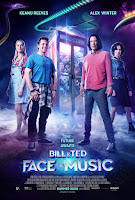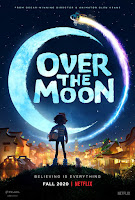In case you missed it, I made my a list of my favorite music of the year, which you can read here.
Movies
Soul (2020)
The comparisons to Inside Out are inescapable, from the premise that materializes abstractions into a slick, colorfully realized bureaucracy (in this case, it's the afterlife, souls, the "spark of life," etc.) to the Second City/SNL/NBC sitcom alum in a starring role (Tina Fey) right down to the person in the lead director chair (Pete Docter, who, in terms of where the thematic vision is in the studio, seems to be poised to become the new John Lasseter of Pixar, hopefully without the toxic work culture). I'd say that Inside Out has more raw emotional heft, but Soul 100% brings the stronger visuals and music. The sequences in the afterlife are visually sublime in a way that Pixar has never attempted before, experimenting with texture and particles in a way that feels more in-line with what DreamWorks Animation has been up to in the past few years than the usually photo-realistic commitments of Pixar (though it's of course executed a lot more expansively than in, say, Captain Underpants). And in terms of the music, the score is absolutely transfixing, making a definitive case that Pixar's musical identity has finally been able to evolve past the Randy-Newmanisms that it's leaned so heavily on in the past 2.5 decades; plus, it's definitely my favorite Trent Reznor/Atticus Ross work in a very busy year for that duo. And the fact that the movie is able to use all this to build a pretty compelling and complex thematic tapestry that connects jazz to a David-Foster-Wallace-ish version of existentialism scratches an itch that I never realized I had. But yeah, it's definitely a lot like Inside Out, and nothing here is completely surprising if you're familiar with Pixar's output at all. I know some people are going to use this as evidence that Pixar has devolved into shtick, and I guess it is a shtick in some respects. But it's a good shtick, and I remain unconvinced that the presence of tropes and formula in a studio's output inherently signals a decline in quality. Pixar certainly isn't redefining the medium like it did for a solid decade at the beginning of the 21st century; its median quality has certainly stabilized somewhat below its early peaks; but most studios have formulaic elements (and even something as revered as Studio Ghibli has its autopilot Onward-esque output), and I dunno, I suppose I think it's interesting that Pixar has a personality well-defined enough that a movie as distinctive as Soul can feel as much like a riff as it does something entirely new. And in the case of Soul specifically, the fact of its familiarity and potential banality in the context of repetition actually feels thematically relevant: the film argues that life is meaningful only as a function of someone's ability to appreciate the beauty of a mundane existence, and that works as much as a life philosophy as it does a lens for Pixar films in general. Increasingly, I'm finding Pixar's films to be enjoyed and even meaningful because of the pristine bits of craft within reliable plot patterns, and on that rubric, Soul is a veritable shower of beautiful little moments and aesthetic flourishes: the almost Looney-Tunes-esque way that Joe obliviously has near-misses with death for the film's first 15 minutes; the dazzling introduction to the afterlife, probably the most stylistically ambitious thing Pixar has done in a decade; the breathtakingly realized human forms, maybe the finest-ever example of CGI animation creating expressive but cartoonish human bodies; the way the exterior lines of the cubist afterlife custodians subtly pull in the grains of sand that form the ground of the afterlife; that entirely predictable but no less affecting moment in which Joe understands the truth about his life's "purpose." This has been the longest possible way to say: Soul is a Good Movie. And now that I've defended you, Pixar, please don't make me look stupid by making Toy Story 9 or something. Grade: A-
Feels Good Man (2020)
A wild, melancholy ride through the history of Pepe the Frog and Matt Furie, the artist who created the character and then watched helplessly as his work turned first into a malleable meme and then an icon of the alt-right. But it's also the story of memes in general and their constant push-pull of ownership and appropriation; it's also the story of a key group of people with a tragic inability to understand how the internet works and who were exploited by those who do; it's also the story of how Pepe became a form of cryptocurrency; it's also a story about occult symbology. This movie could have easily been twice its length, and it's probably to the film's detriment that it's not; a good portion of these ideas feel a little under-explored, and there's a much better version of this movie to be made that simply makes room to explore them more. But the version we got is still a pretty fascinating account, and it has tremendous access, not just to Matt Furie himself, who is the emotional core to the film, but to all number of talking heads, both eccentric (there's a professor of the occult, for example, and he looks exactly like you'd imagine a professor of the occult would), scary (a lot of space is given to a Trump campaign guy, who honestly seems to understand the internet better than anyone else in the film), and ludicrous (we meet a "Pepe millionaire" who made bank on Pepe cryptocurrency and now rides around in an ostentatious sports car blasting a customized version of the Pokemon theme song about "rare Pepes"). It's worth the watch for these people alone. Grade: B+
The Forty-Year-Old Version (2020)
I really wish this were better overall, because Radha Blank is so good as the lead, a somewhat satirical portrait of herself as she tries to navigate what it means to write something authentic when market forces and powerful people only seem interested in amplifying parts of that voice. But the writing and direction (also by Blank) are a lot dicier than her central performance. Like, I couldn't stop being distracted by the way that a movie about how clichés flatten the authentic experiences of minorities relies really heavily on an unironic deployment of a Gay Best Friend, and I feel like that goes for the movie overall, where some truly excellent bits (the entire first 30 minutes of the film, for example) are consistently undercut by some extremely trite or corny bits. But plenty of great writer/directors have dodgy film debuts, and I really hope Blank's cinematic career has enough legs to get her more films after this one inevitably falls into the the Netflix memory void. Because the way she bounces off her own screenplay is wonderful, even when the screenplay itself isn't pulling its weight. Grade: B-
Mank (2020)
Lots of surface pleasures here, from the performances (except for Tom Burke, who is inexcusably bad at playing Orson Welles) to the slightly anachronistic Reznor/Ross score to some of the images (though I do think that this is kind of a failure at b&w digital photography trying to look like b&w film photography, and when it doesn't look good, the movie often looks muddy and underlit). But as a lot of people have already noted, there are some pretty big problems with Mank under the hood. If the point is to give us a biopic of Herman Mankiewicz, it's a hopelessly scattered film, dividing time in a way that doesn't always make sense between some pretty vapid scenes about the screenwriting of Citizen Kane in the early '40s and downfall of Mankiewicz as a studio cog as both his alcoholism and hatred of Louis B. Mayer and William Randolph Hearst intensify. If the scatteredness is the point, a reflection of Mankiewicz's increasingly self-destructive, fractured life, then the screenplay really doesn't do enough to undercut Mankiewicz himself besides relying on alcoholic clichés. If this isn't a biopic at all but rather an anti-nostalgia screed about the beautiful but destructively deceptive myth-making powers of the Hollywood studio machine (the strongest thematic throughline in the movie, I think, and certainly the one that yields the best scenes, e.g. the election-night GOP party), then it spreads the most potent arc (the Hollywood executives plot against Upton Sinclair's gubernatorial campaign) far too thin in favor of the material about the making of Kane, which is absolutely the wrong framing device for those thematic ends. So it's a mess. I guess all this makes it sound like I should give this a lower grade than I am, and perhaps I should, but all issues aside, the truth is that I really did have a pretty good time with this anyway, and it's the kind of movie where it actually feels productive to think about its flaws. So I dunno. It's worth a watch, I guess, if you haven't already. And you better watch it before it disappears into the Netflix memory void and people forget it exists in two weeks. Grade: B
The Wolf House (La casa lobo) (2018)
I know next-to-nothing about the Chilean history this movie is supposed to represent, so I'm mostly approaching it as a purely aesthetic object. And as such, it's stunning: a kind of meta stop motion in which the objects and characters are constructed in front of us as part of the animation, where the objects themselves become the canvas for moving images that slide off one surface onto another. I've never seen another movie that looks like this one does. It's also abjectly terrifying, probably as a direct result of the movie looking so singular—unfamiliarity breeding fear. A nightmare-fuel film if there ever was one. Grade: A-
Television
The Queen's Gambit (2020)
The seams are pretty evident in this orphan-to-chess-champion miniseries. Like a lot of streaming series, The Queen's Gambit feels like it could have benefited from a few more drafts in the writers room: character development happens in somewhat unearned lurches (the protagonist goes from socially awkward misfit to über-cool chic icon in practically the blink of an eye, for example, and the same goes for the arguably more significant transformation from rock-bottom addiction to clear-headed sobriety), and the series's structure as a literally episodic Bildungsroman means that secondary characters pop in and out of the plot at seemingly the narrative's convenience, resulting in a cast that, while always tremendously acted, feels somewhat thin—this is particularly egregious for Jolene, the lone black character and one who appears only in the first and final episodes, both times to give crucial aide to the protagonist without much interior life of her own. But all of these issues are offset by the fact that this is such an eminently watchable series. I tend to be pretty slow going through television, especially television whose episodes are in the 45-60 min. range, but I had no trouble at all watching two of these per night (with the urging of my wife, of course), and as much as I may have misgiving about the bigger picture, on a moment-by-moment basis, this is tremendously exciting. It's a great mix of the familiar and unfamiliar, too: I've seen rags-to-riches sports dramas before, but not about chess; I've seen problematic protagonists stumbling through the mid-century on the wings of their own preternatural talents while narrowly escaping their own personal demons, but rarely starring a female protagonist. It also bears mentioning that Anya Taylor-Joy is a bona-fide star, and her mesmerizing performance basically single-handedly makes this whole thing work at all. I can see this series falling completely flat with another actress cast in that role, but in her hands, it soars. Grade: B+


































